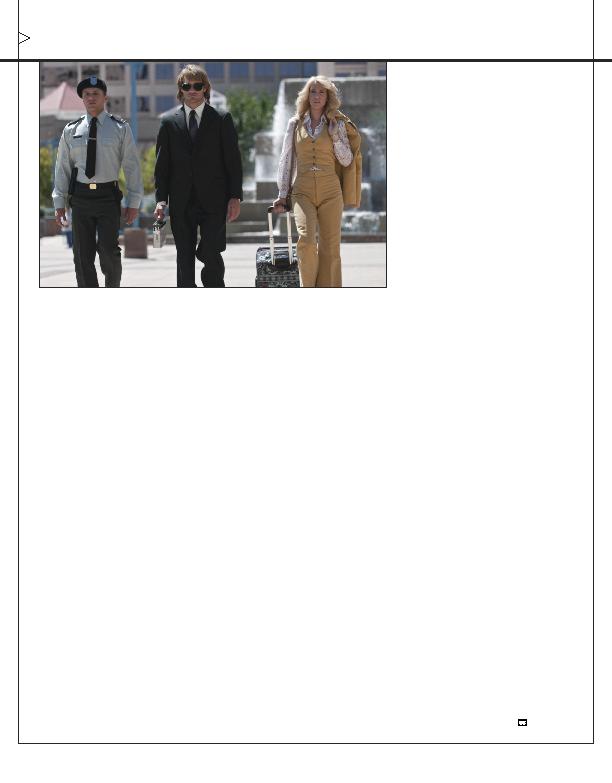
Tacome. Tossing out ideas during one of Satur-
day Night Live's regular Monday pitch sessions,
the writer-director suggested a character who
could be the step-brother of TV cult-hero Mac-
Gyver, the big difference being that MacGruber
made his bomb-defusing gadgets out of revolt-
ing materials no one else was willing to touch or
work with. "It got a huge groan from everyone
in the room," Tacome recalls, "so the fact that
we are now making a movie out of it is mind-
bogglingly wonderful for me in particular."
movie first came up after the 2009 Superbowl
it caught several folks off-guard. "Most people
were baffled," he admits with a laugh. After all,
in every one of the nine SNL skits featuring
him so far, MacGruber died in a fiery explo-
sion after failing to defuse a bomb.
Forte decided to see it as an advantage. Mac-
Gruber was virtually a blank slate, with noth-
ing known about him beyond a collection of
funny emotional issues and the fact that he
was terrible at his job. "It was very liberating
that we didn't have a backstory we had to stick
to," Forte says. "It was wide open territory."
the trio found themselves intrigued by the idea
of taking this character, who had no business
being in an action film, and making him the
hero of the action film.
Kilmer) stages a heist that leaves him in pos-
session of a nuclear missile. The U.S. govern-
ment is forced to turn to the only man with a
hope of recovering the weapon: MacGruber
(Forte). Although the insecure agent has been
in a self-imposed retirement for the past 10
years, when he hears that his old nemesis has
returned, MacGruber realizes he has unfin-
ished business to take care of.
notecards of scenes and ideas. "Actually, it
wasn't even notecards," Forte admits. "We
would tear off pieces of paper." He also recalls
that whenever they would meet at someone
else's home, they'd have to transfer all the
notes and end up with a huge mess of paper
and tape. "There's probably a much more effi-
cient way to do it," he chuckles.
relatively quickly: the cold open with the heist;
the hero challenging the villain in a crowded
out the story around these key moments.
had a skeleton," he says. With the story beats
mapped out, the three writers took turns writ-
ing scenes and sequences during SNL's brief
hiatus and two actual production weeks. In
just over a month, they turned out a mon-
strous 170-page first draft.
picked a genre where everyone knows what
the plot is [like in] that kind of movie. So you
knew you'd have your whole opening crime
and then the evil guy and then you find your
hero." This presented one of the ongoing chal-
lenges of the script: the story began as a very
true-to-form action film. "The beginning of the
movie is rather serious for a cold open," ex-
plains the writer-director, "and, for us, part of
the joke was that we're not winking. The music
feels like it's of the genre, the way we're shoot-
ing it is of the genre, there's no breaking of the
fourth wall. It's meant to really convey that
tone. We were always concerned, `Were peo-
ple going to be on board for this?' It was that
when-do-we-tell-the-audience-what-kind-of-
movie-this-is sort of thing."
acter, which was done by focusing on
MacGruber's insecurities. As hinted at in the
SNL shorts, he is a man with numerous issues,
personal problems and a weak moral center.
"He becomes, weirdly, a three-dimensional
character because he is so flawed," Tacome says.
"It was getting that right balance of lovably des-
picable. Will Forte is so supremely good at find-
ing that balance. A lot of his characters have a
wonderfully despicable quality. So even though
he's flawed, there are some redeemable quali-
ties about him. I love seeing movies where a
character has a lot of personal problems and
somehow you still want them to win."
clear this doesn't imply a loose screenplay. "It
is a very solid script," Solomon explains, "be-
cause there wasn't time or budget for much
improvising." While both writers credit Forte's
strong comedic skills for much of their success,
all three knew there wouldn't be time for fool-
ing around when working. "We had to get
what was on the page and we had to love what
was on the page," Tacome says. "Luckily, we
loved what was on the page."